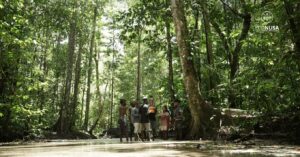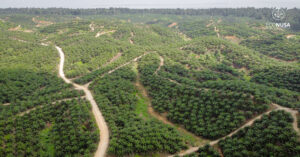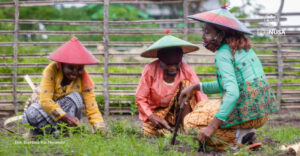
Ecotourism business players in the Land of Papua decline to give up. They make every effort to be independent from anyone including from government’s helping hands. They realize that ecotourism sector is one of the collapsed industries due to Covid-19 pandemic. Tourists schedule cancellation up to the loss of state income has become inevitable condition.
The impact of Covid-19 that severely hits tourism sector is seen from the decline international tourist visits. The Ministry of Tourism and Creative Economy recorded 470,898 international tourist visits in March 2020. If compared to that of the total of 1.3 million tourist visits in previous period, the international tourists’ visits declined by 64.11 percent.
It has clear consequences. Without tourist visits, there will be no job nor income. Around 15,000 tourism workers in Yogyakarta Province should be grounded. More than 33,000 tourism workers in West Java lost their core jobs. More than 7,000 rafting providers stay at home.
The similar stories also happen to Raja Ampat Regency in West Papua. All tourists’ schedules were cancelled. Homestay all of sudden has no occupation. If there are no guests, it means there is no activity and no income.
“It smashes into our business. All homestays are nearly sluggish,” said Kristian Sauyai, the coordinator of Raja Ampat Association of Business Players and Native People’s Livelihood (Perjampat), in the webinar on “Covid-19 Pandemic Impact to Ecotourism in Tanah Papua – Stories from Raja Ampat and Jayapura” on Wednesday 13 May 2020.
Perjampat is an association of homestay owned by the Native Papuans (OAP) in Raja Ampat. Perjampat was founded in 2009 with 8 homestays in Kri Island, South Waigeo, and Gam. There have been 133 homestays under the Perjampat so far. Each island in Raja Ampat has homestay as member of Perjampat.
The spirit of Perjampat is based on the willingness to be independent in livelihood and boost up community capacity while protecting biodiversity. Perjampat builds networks with development partners to improve service quality. In the end of 2019, Perjampat replanted sago trees in Manyaifun Village, South Waigeo District, as they use them to build homestay. As the newly born industry, Covid-19 pandemic is not easy issue to the member of Perjampat.
“The pandemic situation has encouraged my colleague to move on the other way to survive. Some friends focus on how to sustain the existing one,” said Kristian.
Unlike the tourism types, ecotourism could hardly stand alone. Ecosystem service business intersects with nature and community. When both is not running in harmony, ecotourism practice fails to attract vacationers to pay a visit.
Realizing the interconnecting relation, the members of Perjampat continue monitoring sea surrounding their fishing areas from irresponsible practices. This is done by the community of Yenbuba Village in Kri Island. “They ban fishing at the diving site because there is certain group that makes use of the situation to catch fish illegally that could damage environment,” Kristian added.
Sovereignty spirit
The absence of income from the visit of holidaymakers has encouraged local community to be back to their previous life. To meet the daily needs, they cultivate their garden. The activity is done due to their sovereign spirit so as not to depend on other donations. They go back to forest that will suffice all their needs. “Forests can provide anything we need, and we do not depend on the donation from the government or village fund,” Kristian asserted.
The spirit of sovereignty to survive by being self-reliant is also showed by Demianus Wasage, the manager of Trek-Papua Tours. Demianus offers tourism service through nature and Papuan culture trekking to the vacationers. With Demianus, tourists could spend up to 20 days inside the forests for bird-watching tourism. But, with the spreading pandemic, all scheduled visits were cancelled.
“So far, there are 30 visitors’ schedules cancelled. There are still many on progress of discussion,” he said.
To meet his daily life, Demianus changes his profession by selling yellow rice. He also hunts wild boar and sell the catch to the market. On the other hand, pandemic provides more time to Demianus. He makes new trekking paths with the owners of customary forests at Dosay and Sosi Villages, West Jayapura. He also identifies wildlife along the new trekking as new ecotourism offer later.
Ary S Suhandi, the founder and Director of Indonesian Ecotourism Network (INDECON), said that tourism sector will take time to recover following the pandemic. Administrator of ecotourism could prepare technical adjustment in response to the new normal. As to him, the holidaymakers will later be more sensitive to health, hygiene and safety issues following the Covid-19 pandemic.
“Higher awareness of health and natural change has provided benefit to tourism in the Land of Papua,” said Ary.
The ecotourism actors should adjust themselves to welcome vacationers following the pandemic. Ary suggests that ecotourism actors clean up their environment regularly, provides handwashing and soap. Local chef should wear gloves and facial mask. The space of bed on the homestay should be adjusted, for instance.
As to Ary, the widespread ecotourism in the Land of Papua has bigger chance of improvement following the pandemic. The holidaymakers will come in a small group to enjoy the Land of Papua’s nature and culture.
Editor: Leo Wahyudi







